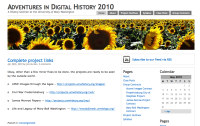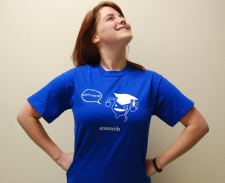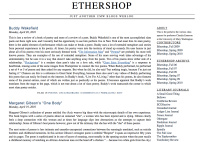Mike Bogle sent a tweet last week asking for some examples of educational blogging on UMW Blogs. I didn’t respond, and he probably thought I was ignoring him, but the bava never ignores, rather it absorbs. And given that one of the things I came away from this year’s Faculty Academy with is a renewed commitment to featuring the work happening around UMW Blogs, Mike’s request provides the perfect opportunity to get that project underway—and I hope it proves both timely and useful. Here is part 1 of a 4 part series, each featuring five blogs from around UMW Blogs.
Jeff McClurken’s “Adventures in Digital History”
This seminar is the second iteration of an experiment in integrating History and New Media at the undergraduate level (see the first here),  and McClurken’s work stands as a flagship example of developing and integrating digital fluency into the curriculum at UMW that provides a powerful example of collaborative, undergraduate-fueled digital scholarship that speaks directly to the immediate community of Fredericksburg and beyond. And such an example also goes to illustrate how public funds can provide an open and available public good.
and McClurken’s work stands as a flagship example of developing and integrating digital fluency into the curriculum at UMW that provides a powerful example of collaborative, undergraduate-fueled digital scholarship that speaks directly to the immediate community of Fredericksburg and beyond. And such an example also goes to illustrate how public funds can provide an open and available public good.
The students work in groups focusing on the creation of digital history projects, all of which are related to making local resources available online. For some examples of student projects see here, here, here, and here.
Mara Scanlon’s Women in Modern Literature, or Gynomod
To quote Tom Woodward, Gynomod seems as much like a rock concert as a course, and I really don’t think there is any better way to put it.  Not only does the course have its own t-shirts (pictured right), but the work students are doing on this group blog is phenomenal. Scanlon frames this course blog as follows:
Not only does the course have its own t-shirts (pictured right), but the work students are doing on this group blog is phenomenal. Scanlon frames this course blog as follows:
How would our understanding of a college course change if, instead of taking individual performance and competitive practice as paradigmatic, we were to conceive of our learning instead primarily collaboratively? And what if collaborative knowledge-building, often seen as having secondary or marginal status, were given a central role in our study of the literary works of modernist women? We must think of this site as a vital piece of that collaborative practice, a fluid record of our accumulating knowledge and a place for the active exchange of ideas.
Be sure to check out the experiment Sarah Lawless did with HD’s HERmione and Flickr as well as the Gynopod experiment. So much great stuff here.
Melanie Szulczewski’s Examination of Global Environmental Problems
This is an aggregated course blog that is pulling in all the students’ posts from their various individual blogs using a consistent tag (which is “envproblems” in this case).  So the course blog really acts as hub for all the posts, and a click on any title leads you back to a student’s post on their own blog. What is remarkable about this course, which Szulczewski made beautifully apparent in her presentation at Faculty Academy, was how the blogs became sites of action for her students, becoming spaces where they increasingly focused their concerns about the environment—through extended comment conversations with one another about their views, ideas, and ultimately choices—into action. Their blogs were not only places for reflection, but an active engagement with the immediacy of the problems facing the environment and what they can do about it. Check out some excellent example of this here and here.
So the course blog really acts as hub for all the posts, and a click on any title leads you back to a student’s post on their own blog. What is remarkable about this course, which Szulczewski made beautifully apparent in her presentation at Faculty Academy, was how the blogs became sites of action for her students, becoming spaces where they increasingly focused their concerns about the environment—through extended comment conversations with one another about their views, ideas, and ultimately choices—into action. Their blogs were not only places for reflection, but an active engagement with the immediacy of the problems facing the environment and what they can do about it. Check out some excellent example of this here and here.
Steve Greenlaw’s Finanical Crisis
I’ll let Martha Burtis’s write-up of this one do the talking:
During the spring 2009 semester, Steve Greenlaw’s international finance students did more than just study the current financial crisis — they created a persistent online resource about the global recession.
Students carefully studied and analyzed the international crisis and decided they wanted to build a Web site that shed light on the reasons behind the meltdown and the ongoing events surrounding it. Greenlaw and the students developed a structure for their analysis and presentation and then spent the spring and summer publishing and updating their findings. In addition to sections on the site that examine the intricacies of everything from the subprime mortgage market to the government bailout, students created a timeline of events and developed a robust bibliography of references.
Claudia Emerson’s Ethershop
Ethershop is actually a super-blog, meaning it is an aggregation of four different class blogs over the course of four years, dating back to 2006.  You can find the original course blogs in the sidebar, and this site actually brings in two reviews of a book of poetry each student was asked to write as part of their Poetry Workshop course. The assignment asks each of them to write about a book of poetry they enjoyed, and layout why in the form of a review. What has happened, 140 reviews later, is that this site has become a popular destination in the open web for people searching for various books of poetry, and more times than not this site provides review for rather obscure books, and the authors of these books have on several occasion let Prof. Emerson know how much they appreciate this project. What’s also cool about this is that it isn’t the “whole course online” idea (which often becomes an either/or formulation), but rather one particular assignment made public as a wider resource for the world of poetry.
You can find the original course blogs in the sidebar, and this site actually brings in two reviews of a book of poetry each student was asked to write as part of their Poetry Workshop course. The assignment asks each of them to write about a book of poetry they enjoyed, and layout why in the form of a review. What has happened, 140 reviews later, is that this site has become a popular destination in the open web for people searching for various books of poetry, and more times than not this site provides review for rather obscure books, and the authors of these books have on several occasion let Prof. Emerson know how much they appreciate this project. What’s also cool about this is that it isn’t the “whole course online” idea (which often becomes an either/or formulation), but rather one particular assignment made public as a wider resource for the world of poetry.


Jim, thanks so much for this. I am actually going to present all the things I saw at the conference to our CELT team here, and this will help me walk through some of them.
I remain blown away by the scale of what is happening down there. And I have a post brewing in my brain that will either be called “The Art and Craft of Edupunk” or “Post-modern Edtech” which deals with how what’s starting to happen is we are getting past the modern impulse to move forward in leaps and bounds to the “Next big thing” and becoming more interested in how the technologies we already have can map on to what we do in surprising ways — we’re getting past the age of Rock Stars and into an age of a thousand little indie bands, each with their own beautiful quirky take on the same core stuff.
It’s hard to see that out here, because we haven’t hit where UMW is, each effort is still a very hard, directed slog. We’re still in a time of Rock Stars here, a modernist age where we are trying to push things “forward”. But UMW showed me the light at the end of the tunnel, what things look like when you get forward enough that you can start circling back, finding those interesting opportunities you missed the first time around, apply what you learned from the first three semesters to the fourth, etc.
On a related note, this post did not use the term “reimagine” once. What’s happening to you?
Remember this from way back in our UR days? Might be time to revive the format. Making it open for others to submit via a google form would open up the conversation as well. What do you think?
I thought blogging was silly. Did I miss a memo?
Congrats to all. Hard to believe what’s grown in the six years since the fateful road trip.
I’m looking forward to the next installments.
Seeing this awesome stuff from UMWBlogs makes me shake my head at all the private members-only sites on UCalgaryBlogs. WTF? Why do people lock down sites?
Keep up the awesome work, Reverend (and UMW!)
Yeah, ditto, me too, what they said… and more.
I can’t wait for the next installment. I’m feeling this is just the tip of a lovely sweet iceberg.
At many places, examples like this are among the long tail edge of early adopters, but whatever is in the water in Fredericksburg (keep it flowing) has pushed this across the alleged chasm to a wider group, a fleet of innovators.
And like D’Arcy alludes to, the real power is that it’s all out in the open, and there is something to be gained from that.
Keep those hits coming.
Pingback: Great Examples of Educational Blogs « Ron Bramhall
@Mike,
I’m getting self-conscious after Tom;s Deck Wars impersonation, no more re-imagine for me. As for the Modernist/Post-modern vision of this stuff, I love that whole way of framing it, and talking with you that last night has my own series of posts brewing, not least of which gets at that circling back ideas. We are all kinda looking at each other at DTLT, and I think the circling back right now is what needs to happen. We need to stop chasing and start cultivating, and the post you right may very well give us the tools to start framing that approach moving forward—or at least for the next three years, given that’s all any of us have in this field 🙂
@Tom,
I think that’s a great idea, put a form on that baby, it will be useful to keep an ongoing record of all the course blogs at UMW for the last three years. Funny i forgot about that, but I remember the Octopus clearly.
@Gardner,
So much of these examples, and the 15 to come are framed by your early and still amazing prototypes, to play on Mike’s analogy of Modernism, you were, and always will be, the Kubrick 🙂
@D’Arcy,
As you well know, I am just the messenger, but it is nice to have so much stuff to choose from. And as usual, I am making my blogging reputation on the backs of UMW’s faculty.
@CogDog,
Yeah, this is exactly the kind of blogging that has been eluding me of late, but in the end it is probably the most useful and fun for me to do. I like doing it, everyone loves to be spotlighted, and folks out there trying to make inroads at their own schools may very well have some good examples to build on. No one loses, and I can take a break from attacking my friends for once 🙂
Pingback: 20 Examples from UMW Blogs (Part 2) at bavatuesdays
Pingback: Blogging examples in Higher Ed